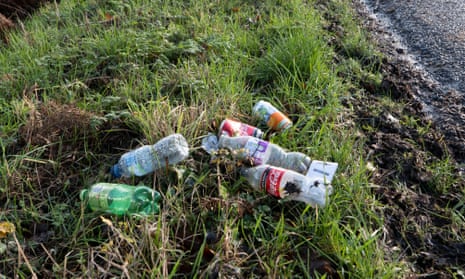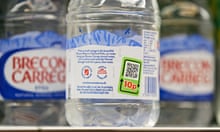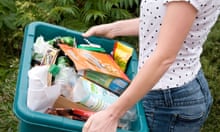A promised deposit return scheme for plastic bottles to cut marine pollution will not be in place in England, Wales and Northern Ireland until late 2024 at the earliest – six years after it was announced by the government as a key environmental policy.
Critics said the delay was “embarrassing” and not the sign of a government committed to tackling plastic pollution.
The environment minister Rebecca Pow announced the publication of a second consultation on a deposit return scheme (DRS) on Wednesday. The document revealed no such scheme would be introduced until late 2024 – more than a year after the original deadline for the initiative and after the next general election in May of that year.
The new consultation document said ministers were still committed to a deposit return scheme but Covid-19 “had disrupted the economy and society in unimaginable ways, with many people reassessing their values, decisions and priorities in both the immediate and longer term”.
“On this basis, our second consultation will build on the first consultation, offering a chance to explore further what the continued appetite is for a deposit return scheme in a ‘post-Covid’ context,” it read.
A DRS was first announced in 2018 by the then environment secretary, Michael Gove, to cut the litter polluting the land and sea by returning a small cash sum to consumers who return their bottles and cans. It came after years of campaigning and with a warning from Gove that it was “absolutely vital we act now to tackle this threat and curb the millions of plastic bottles a day that go unrecycled”.
The government’s manifesto promise in 2019 was to introduce a deposit return scheme to incentivise people to recycle plastic and glass and the first consultation was met with a high level of support for the scheme.
But after years of discussions and ministerial engagement the new consultation document published by the Department for Environment, Food and Rural Affairs, showed no decision had yet been made on what kind of deposit scheme should be in place.
Options include an all-in deposit return scheme for all plastic bottles, glass bottles and aluminium drinks cans and a scheme that just covers containers bought and used in takeaways.
Across the UK, consumers go through an estimated 13bn plastic drinks bottles. Only 7.5bn are recycled. The remaining 5.5bn are landfilled, littered or incinerated. The scheme when introduced would cover PET plastic bottles, glass bottles and steel and aluminium cans.
The Scottish government has plans to start its all in deposit return scheme in July next year.
Pow told the environmental audit committee on Wednesday that the DRS was important to put in place a “fully circular economy … which we have talked about for so long.
“One of the really important aspects of it is to reduce litter,” she said.
The government defended the delays, saying: “We believe this revision presents a realistic yet equally ambitious timeline to implement a complex but incredibly important policy in the most effective way possible.”
But Sam Chetan-Welsh, a political campaigner at Greenpeace, said: “Taking more than seven years to introduce a bottle return scheme, when other countries have had them for decades, is embarrassing.
“This is not the action of a government that is serious about tackling plastic pollution, and is nowhere near world-leading. Further delay means billions more plastic and glass bottles and cans will be dumped or burned. This is asking our rivers, oceans and wildlife for an extension they can’t afford to give.”










